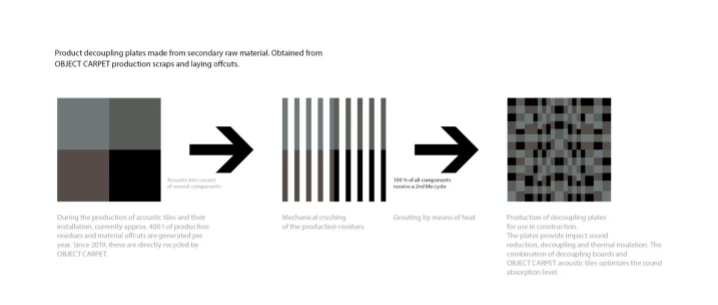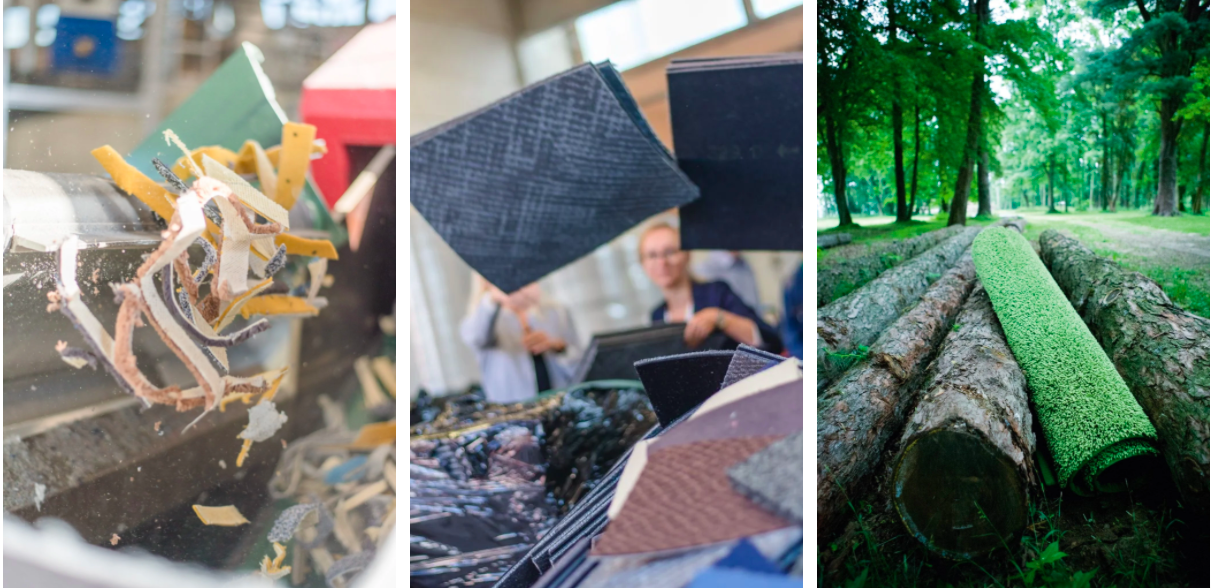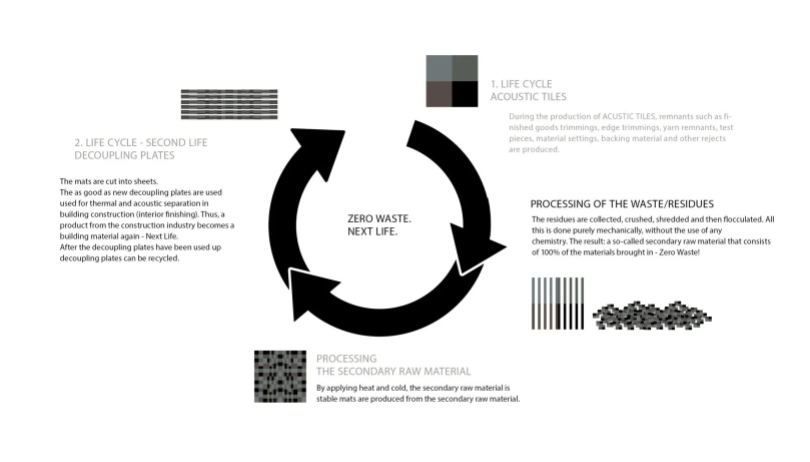Giving carpet tiles a whole new lifecycle in just one process. All materials used are fully recycled. Ecology meets economy
The floor coverings specialist OBJECT CARPET is continually setting new benchmarks with its commitment to sustainable production and business management. The company has now succeeded in recycling 100 % of the materials used to make carpet tiles in a single economical process.
The tiles are designed specifically to be fully recyclable, while the isolating mat that is produced gives a new life cycle to production waste. The company is now investing in a fully sustainable production cycle at its Krefeld site.
“We’re taking matters into our own hands!”
OBJECT CARPET Managing Director Daniel Butz is a doer and a motivator. For him, progress means always keeping on the move, being active and driving forward environmental processes.
The company, which is now run by the second generation of the owner family, has always produced durable carpets for sophisticated interiors and upscale homes. They are made from high-quality materials and are free from harmful substances and emissions, thus promoting a healthy living and working environment.
“Conserving and not wasting resources, recycling products – protecting the environment is firmly embedded in our company’s DNA,”
— Daniel Butz explains
The firm is now taking another major step towards the future: “ZERO WASTE. NEXT LIFE! By 2024, we want all of our new products to be part of the circular economy.” This means fully recyclable designer carpets without an environmental footprint. OBJECT CARPET will thus be closing the environmental loop.
Even now, the carpet manufacturer’s premium products generate as little waste as possible. Avoiding waste, preserving resources and reducing emissions wherever it can has always been the guiding principle of a company ahead of its time.
With innovative manufacturing technologies and certified high-quality products, many of which are already made from recycled raw materials, OBJECT CARPET is helping to protect the environment and keep people healthy.
OBJECT CARPET began very early to design its carpets and carpet tiles in such a way that they only contain clean materials from the circular economy and recyclable substances without any toxic chemical compounds – put simply, designed for recycling. They have been free from bitumen, latex and PVC since as long ago as 2017 and are fully recyclable as a so-called secondary raw material. This means that no chemical recycling processes are required either, something that can only be achieved with clean, circular materials. That is because, at OBJECT CARPET, the entire product is always recycled in a single process and does not undergo laborious and time-consuming separation, get transported here, there and everywhere and generate high costs to end up “only” in energy recovery or, worse still, in landfill.
Instead, remnants such as trimmings from finished goods, cut-offs from edges, leftover yarn, test pieces, material formulations, backing material and rejects are collected up and shredded. These are then turned into a secondary raw material in a purely mechanical process involving no chemicals whatsoever. This secondary raw material is composed solely of the materials that were fed in – nothing is added or generated as waste. The material is then heated and cooled to produce stable matting, which is cut into individual pieces and given a new lease of life as a soundproofing building material. What is more, three quarters of all the products in the whole OBJECT CARPET collection are made from 100 % recycled yarn at present.
“By designing products to be recyclable, we want to save resources and combat waste: protecting the environment, the human race and the natural world is always our top priority,”
— says Managing Director Daniel Butz
This is because the people at OBJECT CARPET have spotted the opportunity that using waste as a raw material presents. By developing a future-oriented recycling process for modern carpets, the company is balancing ecology with economy. “Avoiding waste is part of our history,” underlines Heiko Kühnen, Head of Production at OBJECT CARPET.
“We’ve been systematically searching for solutions for reusing and recycling yarns, production waste and packaging materials for over 20 years.”
This means ongoing restructuring and investment in the production lines too:
“We overhaul processes, renovate our buildings to make them more sustainable and research how we can fundamentally improve our products to ensure we close the loop – entirely in the ‘designed for recycling’ spirit,”
— explains Lars Engelke, Managing Director Production & Development.
This enables the carpet manufacturer to give the materials it uses a whole second lifecycle. It does not stop there, however, as the first new product with an unlimited number of lifecycles will soon be making its debut.
“OBJECT CARPET is currently laying the foundations for a completely sustainable production loop at its Krefeld site. These are investments that will pay off in the future in every sense of the word,”
— says Lars Engelke
“We’re taking an existing building product and turning it into a completely new one, while staying in the same industry and with the same customers.”
Offcuts and leftover material from laying the carpets – both generated in the first product stage – are given a second life as isolating mats for the building industry, where they are used for thermal and acoustic decoupling in structural engineering.
With the highly sound-absorbing insulation mat, therefore, OBJECT CARPET is sending out an important signal about environmentally sustainable construction that is conducive to healthy living. The acoustic tile, for instance, provides even greater sound insulation in combination with Vöwa’s Vitherm® isolating mat.
At the same time, customers who purchase a carpet from OBJECT CARPET get the guarantee, reassurance and confidence that they are buying a fully recyclable product and are thus also doing their bit to protect the environment. That is not all, however: carpet layers can also help shape a green future right now and contribute to a new lifecycle by returning their leftover tiles and offcuts.






















